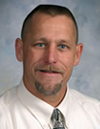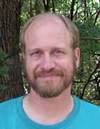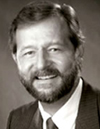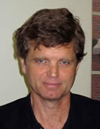 |
Laurence Alexander
College of Journalism & Communications
Juris Doctor, Communications Law - Tulane University, 1987
Doctor of Philosophy, Higher Education - Florida State University, 2007
Teaching Philosophy Excerpt: The best teachers are those who have an unquenchable thirst for knowledge. Though they clearly understand their subject area, the academy's finest always seek to discover more about their discipline, their discipline's relationship to other disciplines and their teaching methods. Many of the best teachers have active research programs that complement their instructional efforts. Their scholarship, therefore, advances knowledge and keeps them abreast of changes in their field. As a member of the faculty at this major research institution, I have worked to advance knowledge in our field, but I have always paid attention to the effects of my research on my teaching.
Academy Pedagogical Pointer: I believe we should try to bring our students to higher levels of knowledge, understanding, and creativity, and we should resist the temptation to teach at the lowest common denominator. As the gatekeepers of educational quality, we must uphold our mission of providing high-quality instruction. We must hold ourselves accountable for raising the achievement level of our students. It is our responsibility to open students' eyes and minds to new information, methods, processes, technologies and new ways of thinking. In fact, I believe assignments must be at at a sufficiently high level to challenge especially our best and brightest students. It's up to each of us as teachers to personally account for the rigor in our course requirements and assignments.
|
 |
Robert Cox
(No longer at the University of Florida)
College of Design, Construction & Planning
Doctor of Civil Engineering - Virginia Polytechnic Institute and State University, 1994
Teaching Philosophy Excerpt: My approach to education is a simple one that contains only a few ingredients. The first of those components is an open mind that is always seeking knowledge. With this open mind I am able to continuously learn from my colleagues, industry peers and my students. I feel that it is so very vital that educators treat their students with respect, remembering what it was like to be on the other side of the desk or podium. The second ingredient to my teaching philosophy is effective communication. The most important link in the classroom is communication. By having an open mind and respect for my students, I am able to encourage participation by making it clear to everyone in the course that I do not know everything there is to know and that we are seeking more knowledge together from different perspectives. The third ingredient is honesty. I am not ashamed to admit when I do not know an answer, rather I am energized when I am able to seek and find the answer with my students. Maybe my approach is like a mentor or coach. The fourth ingredient to my philosophy is making theory and concept become practical knowledge through the use of analogies and the effective application of practical, applied research results. I concentrate on presenting even the most difficult theories in the context of everyday life. Applying daily lectures to student experiences and my own research and related work experiences makes the information being discussed seem more practical and relevant.
Academy Pedagogical Pointer: My BCN4787 was the first university setting to incorporate the use of e-Builder, a collaborative internet application for construction project management know as a Project Specific Web site (PSWS). e-Builder was developed by one of my former graduate students and is still viewed by many as a pioneering technology in the construction issue. The collaborative nature of information sharing via the Internet has been a part of my class since 1997 and many of the application developments and redesigns have been a result of our classroom use.
|
 |
Gail Kauwell
Institute of Food & Agricultural Sciences (IFAS)
Doctor of Philosophy and Food Science and Human Nutrition - University of Florida, 1993
Teaching Philosophy Excerpt: To me, teaching begins with caring - caring about the students, caring about helping them learn and develop the skills and abilities that will help them achieve their goals and dreams. It means taking time to mentor and encourage students, finding ways to facilitate learning and personal growth, and "seeing with the heart" - observing and noticing students, respecting them as individuals, and taking an interest in their lives. It also means sharing - sharing life experiences, anecdotes, and the lessons learned from successes and failures that may have the potential to motivate and inspire students. As a "teacher," I believe that it is my responsibility to guide, challenge and stretch students, which includes helping them understand that the learning process is a partnership for which we all must take personal responsibility. Part of my responsibility in this partnership is to hold students accountable to high standards and to ensure that my commitment to high standards is apparent from my demeanor. It also is my responsibility to demonstrate my enthusiasm for and commitment to teaching, to make the class relevant to the learners, and to challenge the students to perform at a level that reflects their personal best. Ultimately, my goal is to make a difference in the lives of my students - for contributing to their success is the greatest reward that teaching holds.
Academy Pedagogical Pointer: Although some students enjoy the anonymity of large classes, others really want to feel like their professors know something about who they are, what makes them "tick," what they have achieved, or the goals and aspirations they have for their lives. Over the years, I have enjoyed becoming acquainted with the students in my large classes by asking them to complete a student information card that includes a photo and provides the type of information outlined above. I reciprocate by sharing information about myself on the first day of class. This helps to break some of the barriers of a large classroom. It also helps me to realize and remember that my students are often very accomplished in areas outside of my expertise and could easily be one of my teachers.
|
 |
Douglas J. Levey
College of Liberal Arts and Sciences
Doctor of Zoology, University of Wisconsin, 1986
Teaching Philosophy Excerpt: My first taste of teaching changed my life. As I gained confidence, I started to experiment with different techniques and to develop my own style. Before long, I discovered the rewards of teaching that make me feel privileged to be a teacher (to this day!). I’m convinced that the best teachers teach themselves through experience.
Academy Pedagogical Pointer: My vision of improving teaching at UF targets graduate students. They are young and impressionable (in the best sense of the word) – get them hooked on teaching and the impact will be immediate and lifelong. Everything else will fall into place. Furthermore, a teaching program that focuses on graduate students will complement programs already in place that focus on undergraduate students and faculty.
|
 |
Michael Olexa
Institute of Food & Agricultural Sciences (IFAS)
Doctor of Plant Pathology - University of Florida, 1976; Juris Doctor - Nova Southeastern University, 1980
Teaching Philosophy Excerpt: We really need to communicate better to get an understanding of what's going on with each other's teaching programs and how we can work together in developing multi-disciplinary courses. So many of us have the tendency to become somewhat isolated in our own colleges and disciplines. I'm sure that even in what appears to be incompatible disciplines, there exists opportunities to learn from each other and collaborate in teaching programs for the benefit of undergraduate and graduate students. This, I've discovered myself in teaching a course (Agriculture Law & Risk Management) with an engineer.
Academy Pedagogical Pointer: I sincerely believe that the future of quality teaching, more often than not, rests with today's graduate students. If we reach out early, help and nurture them in their teaching, we'll be carrying out a service of significant benefit to them, their students and the system of higher education.
|
 |
Robert Ray
College of Liberal Arts and Sciences
Doctor of Comparative Literature, Film - Indiana University, 1978
Teaching Philosophy Excerpt: Teaching resembles the Anglo-American system of common law: in both, abstract principles arise, almost as an afterthought, from the demands of particular situations. Such principles matter, but in everyday life, they count for less than the procedures that achieve, apparently without philosophy, certain desired results. A teacher's effectiveness, in other words, probably depends less on his pedagogical theories than on the rules with which he conducts a class. Thus, while twenty-five years in the classroom may have left me with the ability to articulate my teaching goals, I must admit that I began with only a set of procedures, which I have retained.
Academy Pedagogical Pointer: First, I attended closely to the syllabus as a form, regarding it as a course-in-miniature, capable itself of teaching the course's organizing argument. Second, assuming the enormous pedagogical advantages which accrued to a prepared classroom, I based 50 percent of a course's grade on class participation and daily reading quizzes, thereby allowing students an evaluative basis considerably broader than a single written assignment. Third, I graded papers very carefully, trying to show with my own editings how a student could learn to represent his or her ideas in the best possible light.
|








